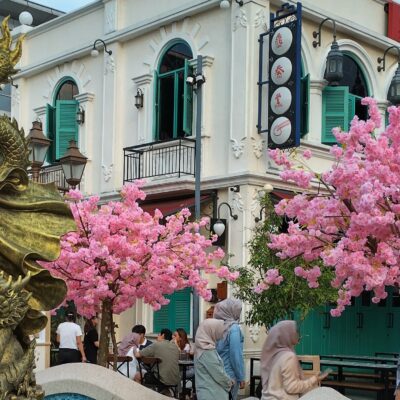It’s been well-documented that democracy has been in decline globally over the past 15 years or so. Recently there’s evidence from Freedom House that this decline is accelerating. A critical example is the invasion of Ukraine by Russia in February, an attack which has fuelled speculation about whether China might be emboldened to attack Taiwan.
How is democracy faring in Asia, particularly Indonesia, the world’s third largest democracy? What’s the state of Indonesian democracy after two years of the COVID-19 pandemic? Will the pandemic’s pressures on civil society result in a resurgence of Islamist groups pushing to impose conservative values on public life?
Professor Robert Hefner, from the Pardee School of Global Affairs at Boston University, is a leading scholar on international affairs and religion and on Indonesian democracy. He spoke with Melbourne Asia Review’s managing editor, Cathy Harper.
You’ve recently been senior producer of several films about democracy and Islam and Indonesia’s 2019 national elections. I wonder if you can give us an assessment of the current state of the relationship between Islam and democracy in Indonesia? Has it changed/is it changing due to the COVID-19 pandemic?
The impact of COVID, both on democracy and more specifically on the Muslim community, has been for the most part challenging, but the response of Muslim leaders has been reassuring. Ever since the Jakarta gubernatorial election campaign in 2016-2017 there’s been a great deal of understandable concern as to whether, let’s call them, Islamists forces were on the ascent. After COVID first broke out in Indonesia, true to form, some of the more extreme Islamists immediately mobilised to present the pandemic as a calamity that had been introduced by the West and/or was otherwise being manipulated by Western powers, perhaps even in collaboration with indigenous or native forces, including the government in Indonesia.
One of the most gratifying insights from Zainal Abidin Bagir and my film research for our one films on the pandemic in Indonesia was the discovery that, in fact, after a period of initial uncertainty as some of the more radical Islamists mobilised, reports like these were quickly discredited. Conversely, a variety of mainstream organisations—first and foremost Muhammadiyah and Nahdlatul Ulama, but also a variety of multi-religious and non-affiliated non-governmental organisations—rose to the pandemic challenge. They did better responding to the COVID-19 challenge than did many of my fellow citizens in the United States. The response from Muslim mass organisations was particularly impressive, and I think it bore witness to the fact that in the aftermath of the anxieties that we all had after the 2016-2017 Jakarta gubernatorial campaign, mainstream Muslim organisations have rebounded and are again reasserting themselves.
My sense, then, is that the challenges that Indonesian democracy faces have more to do with structural vulnerabilities that are plaguing or afflicting democracy around the world than they do anything specific to ‘Islam’ or Muslim society in Indonesia. As Larry Diamond has best shown at a global level, and as Mark Thompson has demonstrated here in Southeast Asia, it is not just in Muslim majority countries that we see that there has been a significant regression in the quality of democracy and an upsurge in populist majoritarian currents in society. Political systems, in particular open democratic political systems around the world, have been unexpectedly challenged by the rise of the internet and the impact of its operation on what we can call the public sphere. What social media have done in places such as Myanmar, Thailand, the Philippines, Indonesia, France, the United States (we could go on) is that they have has facilitated a greater segmentation and sectarianisation of the citizen public. Social media have reshaped the terms of public participation through a skilful algorithmisation of political participation, with the result that one often sees the development of a more severe sectarian divide. This has been a challenge for democracy all over the world, not least in my own United States. It’s been a challenge too here in Indonesia, as was most dramatically illustrated in 2016-2017. That said, among Southeast Asian nations, and to put it too bluntly, I think Indonesia is doing about as well as or even better than other countries, even in this age of democratic regression.
Why is it doing well? It would seem to be a place that could possibly be more volatile than others.
There are large segments of the Indonesia populace, particularly the Muslim populace, who can be described as socially conservative on many matters, not least with regards to gender/sexuality and the rights of religious minorities. But I think we have to be careful to distinguish between an affirmation of socially conservative values and openly anti-democratic currents as such. Indonesia is a culturally and religiously complicated place, not least with regards to matters of social recognition and public ethics. So, it’s not surprising that the transition or return [to democracy] didn’t realise the hopes and aspirations of many people who thought Indonesia would somehow jump ahead of Western democracies and be more tolerant or ‘secular’ than they are. But that said, from an institutional and, in particular, an electoral perspective—if not as judged from the perspective of an egalitarian and inclusive public sphere—the system has performed relatively well. There has been a regression in the quality of democracy from a patronage politics perspective—the kind of things that Vedi Hadiz brilliantly underscores, along with Edward Aspinall, Marcus Mietzner, and Eva Warburton, among others. But the degree to which Muslim politics has been commandeered by patronage politics I think is actually a bit less than we might have anticipated—not least, again, if we compare Indonesia with other Southeast Asian countries, or with India with its Hindutva surge.
With regard to the Muslim community, the major social welfare organisations—in particular the NU and Muhammadiyah—continue to surprise in a good manner. These are the pillars of Muslim civil society. They are not ‘liberal’ in any Western sense, particularly of the expressive individualistic sort ascendant in most Western countries since the 1960s. But these organisations are democratic in a civil-Islamic if not ‘secular liberal’ sense. And they have played a central role in the process of convincing the Muslim public that democracy is compatible indeed, needed, for Islam. They began a new phase in this campaign in support of democracy back in the late 1980s and early 1990s. After the return to democracy in 1998-1999 many people were worried that campaign might not be sustained, but its core message on the compatibility of Islam and democracy has been sustained, despite non-stop challenge from anti-democratic Islamists and from the conservative nationalists who often fund them (as occurred with the anti-Ahok gubernatorial campaign)
I think the simple answer to the question of why Muslim politics in Indonesia has embraced a larger portion of what we might call a democratic agenda has been the commitment of Indonesian Muslims to, not a secular liberal democracy (elements of which have long been rejected), but a multi-ethnic and multi-religious nationalism. Indonesia is unusual among Muslim-majority countries in this regard. Even while promoting what Jeremy Menchik has called a variety of ‘godly nationalism,’ the majority of Muslims have resisted calls to establish an Islamic state so as to instead support a multi-religious nationalism. The resilience of this ideal is remarkable, especially if you compare Indonesia with Egypt, Morocco, or even countries where there was at one point a great aspiration for a multi-religious state, multi-ethnic nationalism. Syria and Iraq were not able to carry through on the aspiration for such a multireligious nationalism for a variety of tragic reasons. Indonesia to a much greater degree is one of a very small number of Muslim countries—Mali was another one prior to the military coup and Senegal has become complicated—where there was a similar aspiration for a multi-religious nationalism even though Muslims were the overwhelming majority. There are complex historical and sociological reasons for the continuing popularity of the civic nationalist ideal. On one hand, Indonesian history shows us that the commitment was tested and even undermined during the great contest between ideological currents in Indonesia from the late 1950s until, in particular, 1965. But the violence of 1965 and 1966 passed and then we began to see Indonesian Muslims, a significant number of them, and in particular those in Muhammadiyah and NU, return to this vision of an inclusive if not fully religious undifferentiated variety of Indonesian nationalism. If we compare Indonesia with other Muslim majority lands, the continuing appeal of the multireligious national ideal is remarkable.
I underscore that in the West we generally think, too simplistically, that ‘we’ don’t differentiate citizenship religiously. But, in fact, political sociologists and historians now recognise that, whether it’s in France or in Denmark, or in any number of other European countries, or with the rise of former President Donald Trump in the United States, a major portion of the populace has fallen back on a crude identity politics that does discriminate among citizens on the basis of religion, as well gender, class, and race. Although they’re a full 10 percent of the population, Muslims in France are not given equal civil rights, and a similar situation is the norm in most Western European democracies. So, yes, we live in an age of democratic citizenship. But ours is not a time in which citizenship is at long last free of religious, ethnic, gender, or racial inequalities. In light of these comparisons, and in light of the undemocratic legacies of the period from 1959 to 1998, Indonesia, I believe, has made great progress. Yes, much of the Suharto era oligarchs and political elite remained in place after the return to democracy. As Vedi Hadiz and Ed Aspinall (among others) have shown, these carry-overs represent a huge structural problem for Indonesian democracy. But we must not allow these structural issues to blind us to the remarkable progress seen, not least of all, in Muslim civic and educational circles.
Why do you think that is, because as you say we’ve seen it happen so often around the world recently?
Two things. Again, this idea of multi-religious nationalism. The Pancasila model is not secular liberal in the sense that allows everyone ‘in’ on fully equal terms. If you’re a member of a local indigenous religion out in eastern Indonesia or Kalimantan you know quite well that your religion hasn’t been put on par with the six state-recognised religions. And there are other examples. But nonetheless there is this general idea, something close to an operating consensus, that Indonesia is not and should not be an Islamic state, but it should instead be a ‘godly nationalist’ nation. The role of the Muhammadiyah and the Nahdlatul Ulama in affirming that commitment and returning to it even in the aftermath of very, very difficult contentions, such as those seen in the period from 1959 to 1965 and 1966, has been central to the model’s success.
Secondly, and more specifically, one of the more remarkable aspects of the Indonesia story is the beginning of the late 1970s and really accelerating in the 1980s and 1990s—the Indonesian Muslim leadership and Muhammadiya and Nahdlatul Ulama appealed to their respective publics to put aside any fantasy of the Islamic state, whatever that may be. From a comparative politics perspective, and especially when we compare Indonesia with Muslim-majority nations in the Middle East and North Africa, this effort on the part of mainstream leaders again stands out as exceptional. The kind of mythology of the Islamic state that you see capturing the imagination of people even in great Muslim-majority countries like Egypt didn’t capture the imagination of the great mass Muslim Indonesians.
You are also positive about Indonesia in terms of gender equality …
The survey data indicates that when you do a general random poll of the Muslim populace, as I have some years ago, Indonesian public opinion does not appear to be gender inclusive or gender egalitarian. In fact, on certain critical points, such as ‘is the male the head of the household?’ and things like that, Indonesia comes up, compared to other Muslim majority countries rather gender conservative. But if you look at employment trends for women, if you look at educational achievement for women, if you look at research by Nancy Smith and Kathryn Robinson on new ideals of intimacy, the situation of Indonesian Muslim women looks different and much brighter than the survey data indicate. Indonesia has the highest rates of women’s employment, extra-domestic and extra-familial employment, in the Muslim majority world. The rate of employment is three times as high, about 56 percent, as its counterparts in the Muslim Middle East. In the United States the rate of extra-domestic, extra-familial employment for women is about 46 percent, although it varies somewhat depending on what measure you use. In Jordan, where great numbers of women receive a college education, rates of employment for women are currently only about 13 percent. And then last, but not least, look at the transformations of intimacy in Muslim Indonesia over the past generation. Look at how people, women in particular, bring new expectations as to what a proper, heteronormative mate (Nancy Smith and Kathryn Robinson study this) is expected to do with regards to personal expressivity, emotional involvement, and care for one’s partner. On this gender reality, Indonesia has changed profoundly and in a way that is unambiguously driven by the aspirations of Indonesian women in general and Muslim women in particular. It’s a great and profound transformation, even if it isn’t ‘liberal’ in our Western sense of the term.
Do you see this as being something to do with the Indonesian version of Islam or something else?
I think it’s a very complex interaction. It’s distinctive in the degree to which there is a carry-over in family relations in kinship in styles of sociability between men and women from the pre-Islamic period to today. The ‘Indonesian difference,’ if we can call it that, is not a matter of Hindu-Buddhism or ‘syncretism’ as such, as many Western Indonesianists used to argue. The pattern of Islamisation in Indonesia beginning in the 13th century and really kickstarting in a new way in the 19th and 20th centuries left in place many indigenous gender sociabilities. By this I mean that on matters of dress, humour, affection, kinship, and inheritance Muslim Indonesians carried over habits from local society. You see this in the preference for giving girls an equal inheritance, rather than the half-share recommended in Islamic jurisprudence. The Australian anthropologist, Kathryn Robinson pointed out long ago that, no matter what Muslim region or country, the underlying culture shapes how Islam ‘lodges in place.’ There are always carry overs from that underlying cultural order. If you go to a place such as Afghanistan and you might say, that’s more ‘Islamic’ on gender matters, I think you’ve got it wrong. Afghanistan is historically not more ‘Islamic’, it was more tribal. The extreme patriarchy, the male controls on women’s movement and dress, the high incidence of domestic violence—that’s not Islam. Those are social traits associated with a patrilineal and patriarchal order in which men come to see women as property and assets to be controlled for male honour. Gender relations in Indonesia also show carry-overs from various spheres, including patterns of inheritance and sociability. But, with only a few regional exceptions, they don’t typically veer in the severely patriarchal direction one sees in Afghanistan or some (but not all) parts of the Arab Middle East.
Can you talk a little bit about your concept of ‘citizen belonging’? I understand you see this concept as being much wider than a state-defined legal definition.
Citizen belonging is never just a matter of citizen rights accorded by the state in an equal and undifferentiated manner to everyone who is identified as a citizen. Certainly, on matters of citizenship, states and legal systems are decisive, but they are not uniquely determinant of actual citizen practice. Citizenship as a social practice depends as much and, in many instances, even more on the kind of lateral regard, or, if you will, the politics of recognition, to use Charles Taylor’s old term (the Canadian political philosopher and ethicist), a person receives from fellow citizens around her or him. You can have people, as you have in the United States, even after the passage of civil rights legislation in the 1960s who continue to enact a deeply discriminatory attitude towards ethnic and religious minorities, not least African Americans. They may continue to do so notwithstanding what the state constitution or law says. And as we have seen in the era of Trump and white Christian nationalism in my country, to a significant degree, this pattern of racially-differentiated citizenship remains operative among portions of the ‘white’ public to this day. Again, it is important to recognise that such violations of citizen equality and inclusivity are not just the product of the state. As I argued in a book (Civil Islam) two decades ago, ‘civil’ societies, in the organisational sense of the phrase, can be animated by ‘uncivil’ norms, including those that have to do with discriminations based on race, gender, class, and religion. In fact, if I were to use the United States as a metric, state legislation has often tried to implement inclusive reforms, but a lot of the public, and I mean, in particular, the Euro-American ‘white’ public, is just not on board. This is despite the fact that, organisationally speaking, America has a relatively active ‘civil’ society.
Indonesia is not liberal in the sense of its citizenship being religiously undifferentiated. You have six recognised religions. If you’re not a member of one of those religions, you’re in a secondary position with regards to certain citizen rights. Even in the Muslim community if you profess a minority variety of Islam such as Shia, there can be problems. There is a deep current of antipathy towards Shia in society, and Muslims of Salafist and anti-pluralist persuasion have sought to amplify this sentiment over the last 20 years or so. Even here, however, there is positive push back and contention, consistent with the ideal of an inclusive citizenship.
It goes without saying that the return to a more open and participatory politics in the aftermath of the authoritarian New Order regime provided an opening for Islamist groups of an exclusivist variety, who sought to promote a non-inclusive or Muslim supremacist practice of citizenship. And I do distinguish, incidentally, exclusivist Islamism from a mainstream Islamism. The PKS, the Prosperous Justice Party, is an Islamist party in terms of its basic definition of that term, but it’s not exclusivist in the way or to the degree that more hardline Islamists are. In fact, as a number of studies by Indonesians and Australians have shown (including remarkable long-term research by Yon Machmudi), the PKS has over the past decade has modified its attitudes towards non-Muslims and shifted not in the direction of a fully inclusive Pancasila variety of citizenship but closer to that mainstream ideal. But the exclusivist Islamists—whom we might say depending on which polls you use is probably about 20 percent of the population, a substantial bloc, but a minority—in particular, those who are more organised in terms of very assertive groups such as the Islamic Defenders Front, the FPI, they took advantage of the democratic opening to exercise an influence on the public sphere, as we saw most dramatically of course in the campaign against the Governor of Jakarta Ahok in 2016-2017.
But I take this as an example of the way in which public spheres in all societies, including the United States, are vulnerable to the actions of well-organised sectarian groups. These typically combine skilful street mobilisation and intimidation with the internet—thus taking full advantage of the kind of algorithimisation of public opinion the internet allows. Social-media leveraged sectarianisations like these were a trademark of the Trump presidency, and they continue to play a significant role in American politics to this day. Similarly, if we look at a place like India, a country with a great and proud tradition of democracy, even there the internet and social media have transformed citizenship and the public sphere. Social media have been most skilfully employed by the extremist wing of the Hindutva or Hindu nationalist movement. Some of the militias associated with Hindutva groupings have used the internet not just to mobilise public opinion but to launch violent attacks on Muslims who happen to be eating beef or (as many poor Muslims have long done) transporting cow carcasses after a cow passes away. As many democratic Indians have lamented, the country has seen shocking acts of violence against Muslims and other religious minorities. Again, however, this weaponisation of the internet, and the creation of an exclusive rather than inclusive public sphere, are developments not at all peculiar to India. We can look at the example of the Rohingya in Burma. There too, as International Crisis Group reports have shown, the internet and social media played a major role in the rise of the extremist varieties of Buddhist ultra-nationalism. In short, the weaponisation and segmentarisation of social media have made for a new game even in long-established democracies. Even though it was never as open and inclusive as the German sociologist Jurgen Habermas rather romantically imagined it to be, the public sphere is a critical ingredient in any democracy, and the rise of ‘segmentarising’ social media have put it in peril.
That said, let me just end here with a quick but, yes, optimistic, observation. The Nahdlatul Ulama and Muhammadiyah were slow to respond to the challenge and the opportunity of social media and the internet. But the situation has changed profoundly over the past eight or nine years. Particularly since 2015, NU has blown away the internet world with its online campaigns against religious exclusivists. These campaigns are primarily managed by digitally savvy and politically sophisticated NU youth. In an age in which digital social media have transformed the democratic public sphere, this development is hugely important and, I believe, illustrative of the way in which Indonesia’s mainline Muslim democrats have again and again shown an uncanny ability to reinvent themselves in the face of hardline challenges. The Muhammadiyah has not been as active in this campaign to combat social media sectarianisation. But their leadership and rank and file are making headway too. And the high-quality courses and textbooks on civic education the Muhammadiyah provides in its colleges and universities are again one of those qualities of Islam in Indonesia that inspire hope, even in an age of global democratic regression. Felix Siauw and other exclusive Islamists are of course not going away soon. But all that said, Muslim democrats in NU and Muhammadiyah, as well as Indonesia’s vast array of democracy-minded NGOs, are alive and well. None of this is simple—as the rise of the radical right in my own United States reminds us, we must never take democracy and citizen equality for granted. But Indonesia’s Muslim democrats are making headway challenging the proponents of majoritarian exclusion. Their efforts are making a difference. In an age of global democratic regression, Indonesia’s Muslim democrats inspire hope, and they deserve our respect.
Image: Community peacebuilding discussions, Madura island, East Java. Credit: UN Women/Flickr.




